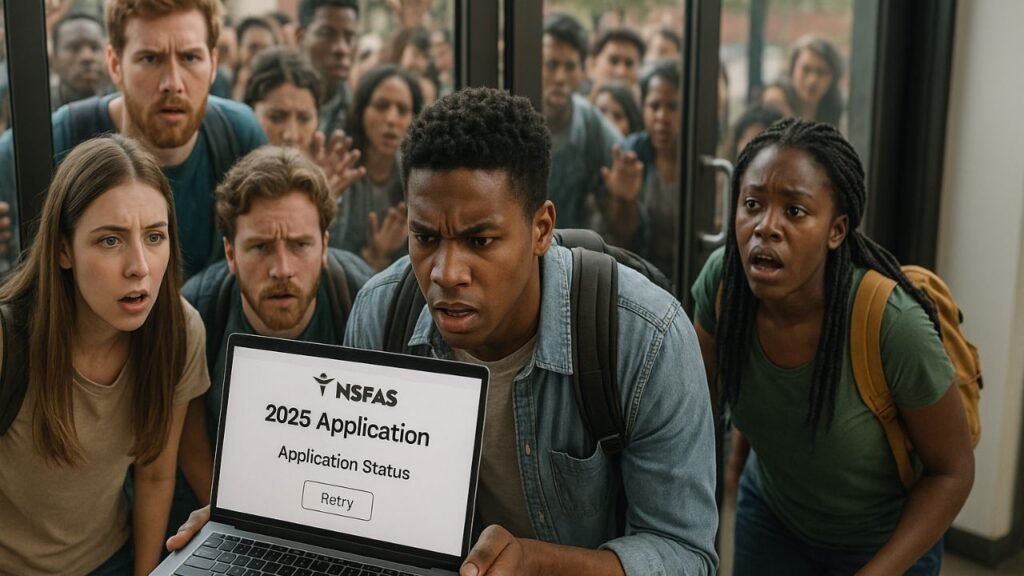NSFAS 2025 Applications – NSFAS 2025 applications have ignited a wave of urgency among South African students, leading to a massive influx of traffic that caused the official application website to crash temporarily. With thousands of students depending on this crucial funding to pursue their tertiary education, the stakes are incredibly high. The moment the application portal opened, hopeful applicants rushed online, hoping to secure financial aid for the coming academic year. Many users reported delays, error messages, and failed submissions—highlighting the overwhelming demand and the vital role that NSFAS plays in supporting underprivileged students. For a nation grappling with rising tuition costs and youth unemployment, the promise of financial relief through NSFAS is more than just administrative support—it’s a lifeline. The National Student Financial Aid Scheme (NSFAS) has since acknowledged the technical issues and promised improvements. Students are advised to remain patient and persistent during the application window. The demand this year is expected to surpass all previous cycles, reflecting increased awareness and economic need across the country.

Website Crash Highlights Desperation for Educational Funding in South Africa
The temporary crash of the NSFAS website is not merely a technical issue—it is a symbol of South Africa’s deepening financial education crisis. Students from across the country flooded the site on the day applications went live, prompting critical discussions on social media and national news platforms. The digital infrastructure of such a vital scheme proved unprepared for the volume of submissions, exposing a vulnerability in how government funding is managed online. According to data from News24, over 180,000 students attempted to register in just the first few hours. This unprecedented demand illustrates both the scale of youth financial need and the growing dependency on state-backed aid. With many families unable to cover tuition and accommodation, NSFAS funding becomes a gateway to opportunity. However, access must be made smoother and more resilient for the system to uphold its promise. Students are now looking to NSFAS for not only funding—but accountability.
NSFAS Responds to Technical Issues and Urges Students to Stay Informed
In response to the backlash and student frustration, NSFAS released an official statement assuring applicants that the system would soon be fully operational. The organization has since deployed IT teams to stabilize the platform and increase server bandwidth to handle higher traffic loads. Students are encouraged to check NSFAS’ official updates frequently for revised timelines and instructions. Moreover, NSFAS is also engaging directly with universities and TVET colleges to spread awareness and provide support for walk-in applications in rural areas. The 2025 intake is especially significant given the expected economic hardships many households are facing post-pandemic. Students are urged to have all their documents ready and to utilize backup submission methods if possible. While the crash has caused delays, the application window remains open for several weeks. Educational stakeholders now emphasize the need for long-term digital improvements to ensure smoother access to future cohorts.
What This Means for the Future of Higher Education Access
The chaos caused by the NSFAS application surge has broader implications for the state of higher education in South Africa. Institutions and NGOs alike are calling for a more student-centered approach to financial aid—one that includes robust digital access, greater transparency, and real-time support. The current technical failures highlight the digital divide, especially for rural and low-income students who rely solely on mobile access. Platforms like xtreme-group.co.za, which amplify youth voices and educational developments, are essential for covering and contextualizing such moments. As the country pushes toward equitable access, future funding schemes must prioritize seamless integration of technology, communications, and policy. The NSFAS incident could serve as a wake-up call for national departments to overhaul how government-backed educational services are delivered in a digital age.
Students Urged to Apply Early and Avoid Last-Minute Submission Rush
Despite the setbacks, NSFAS has urged students not to wait until the final week of applications. With over a million expected submissions for the 2025 cycle, early application offers the best chance to avoid repeat technical issues and to ensure timely processing. Educational advisors also recommend that applicants double-check their eligibility on platforms like Capricorn TVET College or Unisa NSFAS Helpdesk. As part of the application, students must upload all relevant documents, including certified copies of IDs, proof of income, and academic transcripts. Missteps in this stage could delay approval or lead to rejection. Meanwhile, social media remains abuzz with screenshots of the crash, memes about the NSFAS chaos, and anxious students sharing advice. This episode underscores the urgent need for scalable, student-friendly infrastructure. NSFAS holds the promise of transforming lives—but only if it works as intended when students need it the most.






